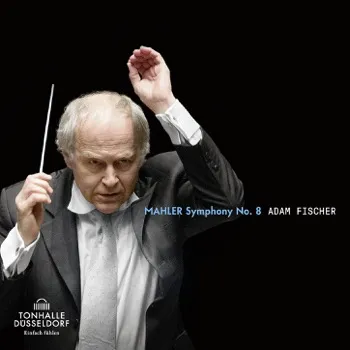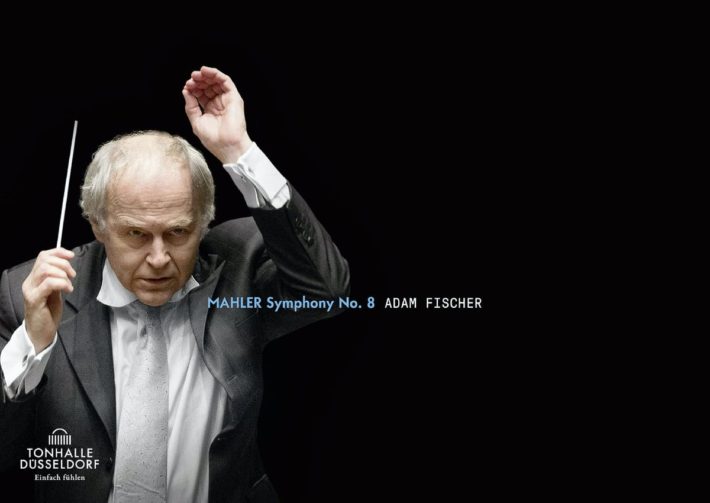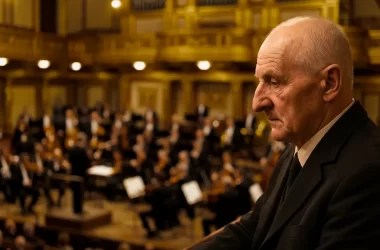This is the newest release in a projected cycle of Mahler’s symphonies by the Düsseldorfer Symphoniker and Ádám Fischer. The previous six recordings have received mostly positive reviews on both sides of the Atlantic, with many critics admiring Fischer’s refreshingly natural interpretations and the vividly characterful playing of his Düsseldorf orchestra. Unfortunately, their new recording of Mahler’s largest symphony proves to be the first weak entry in the series.

The first disappointing comes with the very first beat – the organ is woefully inadequate for this work. Mahler intends the organ to enrich and expand an already extensive orchestral palette, including 32’ pedal stops to shake the hall’s floorboards. The Düsseldorf Hall houses the smallest organ of any European concert hall, and the result is that several key moments in the first movement (as well as in the final section of the work) are weakened by this instrument’s lack of power and presence.
The recorded sound is also disappointing: while there is a realistic sense of left to right across the soundstage, there is almost no sense of depth (front to back) in the sound. The recording ensures Mahler’s dense contrapuntal writing is clearly delineated, but without that front to back perspective the sound lacks richness, sounding somewhat two-dimensional. Solti’s recording (which is now almost 50 years old) is far richer and thrilling to listen to.
Fischer also proves to be frustratingly uneven. The organ’s initial chord is immediately answered by a sluggish choral entry and Fischer’s initial tempo makes the first few minutes sound labored rather than exultant. The performance suddenly springs to life at “Accende lumen sensibus” (track 1, 12’14” – perhaps this passage was rehearsed more thoroughly?) but at 14’58” Fischer yanks the tempo back, disrupting the energy. At 15’50” he again awkwardly downshifts into a massive ritardando that basically establishes the tempo of the recapitulation several bars before it arrives, which makes the recapitulation considerably weaker.
The same moment in Antoni Wit’s performance on Naxos is masterfully handled, ensuring that the beginning of the recapitulation overwhelms the listener. While Fischer makes sure that Mahler’s overlapping cries of praise to the Holy Spirit are clearly heard, they lack real emotional wallop, and the entrance of additional brass (23’30”) is all but inaudible.
The opening of the second movement (a setting of the final scene of Goethe’s Faust, and surely the closest Mahler ever came to writing an opera) is perhaps the strongest part of the recording. Fischer and his players conjure up a deeply desolate atmosphere in the opening passage, and that sense of desolation is only heightened with the entrance of the men’s choir (track 2, 9’15”) – if only the rest of the performance matched this level! Sadly, the entrance of Pater Ecstaticus breaks the spell, with baritone Müller-Brachmann sounding rather forced in his higher range.
This becomes the pattern for the rest of the movement: the orchestral/choral passages feature vivid characterization whereas the solo singing proves to be somewhat faceless. Several of the soloists have a vibrato that becomes pronounced, especially when singing forte passages above the staff. Their work is fine, but rarely more than that, and anyone hoping for a group of soloists to rival those found on the Tennstedt or Solti recordings will be disappointed.
There are several moments that are particularly affecting because Fischer encourages playing of unusual delicacy, particularly the passages sung by “The Younger Angels” (Track 2, 19’35” and 23’10”). The moment Mater Gloriosa soars into view (28’50”) is quite lovely, but cannot match the transcendental beauty heard in Bernstein’s Vienna performance. And while Fischer builds the ending to a powerful climax, it is distinctly underwhelming when compared to the other performances already mentioned.
Mahler described his eighth symphony as “the universe beginning to ring and resound. It is no longer human voices. It is planets and suns revolving in their orbits”. This Symphony is meant to be a transcendental and overwhelming experience and sadly, this new performance rarely, if ever, rises to that level. Solti, Tennstedt and Wit remain the prime recommendations.
Mahler – Symphony No. 8 (“Symphony of a thousand”)
Düsseldorfer Symphoniker
Ádám Fischer – Conductor
Avi Music, CD AVI8553474




















